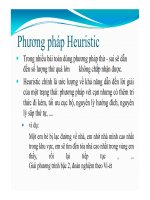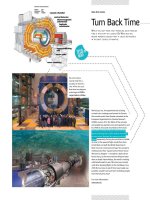Modern Design - Thiết kế chuyên nghiệp phần 2 pptx
Bạn đang xem bản rút gọn của tài liệu. Xem và tải ngay bản đầy đủ của tài liệu tại đây (1.44 MB, 17 trang )
The big-name ‘artistes’ were brought together
by curator Fabrice Bousteau, editorial director
and editor-in-chief of prolic French publication
Beaux Arts Magazine. To completely immerse
his chosen ones in the Chanel brand, Bousteau
took them on a grand tour of Coco’s apartment
at the prestigious Hôtel Ritz Paris, where she
lived for more than 30 years, and oered them
a glimpse into the factories where Chanel
handbags are made. No doubt a few of them
were missing from the production line the next
day! Having opened rst in Hong Kong,
the exhibition will embark on a two-year tour
of the world’s fashion capitals, moving through
Tokyo, New York, London, Moscow and Paris.
Bousteau said of the exhibition; “It’s a sort of UFO
that lands for a number of weeks in the middle
of some of the largest cities in Asia, the US and
Europe”. Indeed, the location for the Hong Kong
exhibition is, bizarrely, on the rooftop of the Star
Ferry Car Park next to the city’s harbour. While it
is a prime location in the Central district, the site
isn’t the most obvious place for a celebration of
fashion and design. Nevertheless, guests at the
neighbouring Mandarin Oriental will be able to
sneak a peak at the container from many of their
ocean-facing rooms. The structure itself is a
collapsible tubular form that completely reinvents
the conventional gallery space, with reducing arch
segments, large-scale white tiles, undulating
walls, swooping curves and an overall graceful
aesthetic. Hadid said; “I think through our
architecture, we can give people a glimpse of
another world, and enthuse them, make them
excited about ideas. Our architecture is intuitive,
radical, international and dynamic. We are
concerned with constructing buildings that evoke
original experiences, a kind of strangeness and
newness that is comparable to the experience of
going to a new country. The Mobile Art pavilion
for Chanel follows these principles of inspiration”.
Mirroring Coco’s designs, which are simple,
elegant and minimalist, Hadid’s creation would
certainly do the fashion world’s most famous
mademoiselle proud. Mobile Art is more
of an experience than an exhibition. Visitors
are invited to wander through the container
together with a soundtrack created by Stephan
“It’s a sort of UFO that
lands for a number of
weeks in the middle
of some of the largest
cities in Asia, the US
and Europe”
Crasneanscki’s Soundwalk; a heady mix of
original music and ambient sounds, visitors will
be equipped with an MP3 player that will guide
them both physically and mentally. Inside, they
will come across artworks such as Nobuyoshi
Araki’s nude, Blue Noses’ imposing sculpture and
Yoko Ono’s Wish Tree, where you pen your wishes
on rice paper and attach them. Inspired by the
shapes found in nature, the organic interior has
more than enough space to showcase the
artworks, including a 128-square-metre terrace
and a 65-square-metre courtyard. Conceived as
an experiment, the exhibition aims to move art
away from the traditional museum setting
and transform it into something more exible,
accessible and dynamic. By associating the 2.55
quilted bag with contemporary designers, the
exhibition will breathe new life into the classic
design and rearm its position on modern-
day catwalks. Coco herself once said, “I want
to be part of what’s happening”, and with so
many ‘happening’ talents contributing to this,
she’d undoubtedly approve. Blurring the lines
between art, architecture and fashion, Mobile Art
transcends not only geography, but industry, to
embody the exhibitions of the future.
For more information visit:
www.chanel-mobileart.com
“Conceived as an experiment, the exhibition aims
to move art away from the traditional museum
setting and transform it into something more
flexible, accessible and dynamic”
Photos: Courtesy of François Lacour
1 | Untitled, installation, © Daniel Buren, 2008 2 | , Floating Crystals, sculptures, © Loris Cecchini, 2007-2008;
Untitled, installation, © Michael Lin, 2007-2008 3 | Comfortable, installation, © Fabrice Hyber, 2008
4 | Handbag factory, photographs, © Stephen Shore, 2007; Wish Tree, installation, © Yoko Ono, 2008
1
2
3
4
20 Modern Design
Photo: Courtesy of François Lacour
1| Designer interior: installation to look like the inside
of a Chanel bag; © Fabrice Hyber, Comfortable, 2008,
installation, courtesy of the artist. 2| Think pink:
Thanging sculptures and mosaic oor; © Loris Cecchini,
Floating Crystals (Incoherent Extensive Formations for my
Deepest Vibrations), 2007-2008, sculptures, courtesy of
the artist; © Michael Lin, Untitled, 2007-2008, installation,
courtesy of the artist. 3| Double act: wall-mounted
photos and standing tree; © Stephen Shore, Handbag
factory, 2007, photography, courtesy of the artist; © Yoko
Ono, Wish Tree, 2008, installation, courtesy of the artist.
4| Mirror, mirror: Futuristic installation; © Lee Bul, Light
Years, 2007, installation, courtesy of the artist.
Photos: Courtesy of François Lacour
Animal print: Avant-garde installation; © Wim Delvoye, Jesus, Love & CHANEL bags, 2007, installation, courtesy of the artist. Photos: Courtesy of François Lacour
22 Modern Design
Image courtesy of Jordan Eagles
SINCE ITS UNVEILING LAST YEAR, BOTTLE KLEIN HOUSE NAMED AFTER THE MATHEMATICAL CONCEPT OF
THE SAME NAME AND DESIGNED BY AUSTRALIABASED MCBRIDE CHARLES RYAN ARCHITECTS HAS GOT
EVERYONE’S KNICKERS IN A TWIST OVER ITS WARPED FORM AND JAWDROPPING AESTHETIC. CONCEIVED IN
CONJUNCTION WITH A GROUP OF MATHEMATICIANS THEIR BOARD MEETINGS MUST HAVE BEEN A HOOT!,
THE DESIGN’S DEFINING CHARACTERISTIC IS ITS NONORIENTABLE FORM, WITH NO APPARENT DISTINCTION
BETWEEN THE INTERIOR AND EXTERIOR SURFACES. KNOWN IN THE MATHEMATICAL WORLD AS A TWO
DIMENSIONAL TOPOLOGICAL SPACE YES, THAT IS A WORD THE HOUSE EFFECTIVELY BRINGS THE OUTSIDE
IN, AND VICE VERSA. WHILE IT’S NOT REVEALED WHO THIS MASTERPIECE WAS COMMISSIONED BY, WE CAN
IMAGINE EINSTEIN WOULD HAVE FELT RIGHT AT HOME HERE.
Nestled amongst the trees outside of
Melbourne, Bottle Klein House works to
challenge our sense of perception, depth,
linear orientation, interior/exterior spaces and
pretty much every notion of what a house
should look like. In fact, its complexity is
enough to bring on a migraine. Nevertheless,
the architects – who can be credited with
other Aussie wonders, such as Monaco House
and the much-lauded QII apartments – have
done wonders with the design, making
what could have been cold and calculating
warm and inviting. Not that this house isn’t
calculated, mind; everything from its precise
angles to its jutting lines are painstakingly
worked out. Somehow though, it still manages
to look eortless, almost as if it was beamed
down from space or assembled quickly like
one of those paper fortune tellers you used
to make as a kid. Cutting-edge in
more sense than one – in fact, an uninitiated
houseguest could very easily poke out their
eye if they were to fall awkwardly into one
of its corners – the 258-square-metre house
features a grand staircase that connects
all levels and revolves around a central
courtyard. Indeed, there is a sense of being
both near and far to all occupants at the
same time, perfect for the close-knit family
unit. While McBride Charles Ryan wanted
to be true to the concept of a Bottle Klein,
they also wanted the design to function as a
home – this, after all, is the whole point of a
residential project. Material-wise, the
exterior is clad with sleek BlueScope Lysaght
metal sheets, bre cement sheets and large
mosaic glass windows, while the interior
features stylish white Signorino tiles, dynamic
Tretford carpet and an ecologically-friendly
bamboo oor. Inside the house is painted
red – though it’s a cinema-style burgundy,
rather than the kind of red you’d see lots of
in a Scorcese ick – while the outside is a
contrast of black and white. So eective is the
colour palette, in fact, that it quite rightfully
earned itself the prestigious Dulux Colour
Award for its exterior. Incredibly, Bottle
Klein House is just a holiday home, so you
can only imagine what the owners’ full-time
residence – and bank balance! - must look like.
At a guess, we’d say this mathematical marvel
was a weekend retreat for the likes of Stephen
Hawking, or someone of that intellectual ilk.
Certainly, anyone of a lesser brain-capacity
may have trouble nding the front door! While
E may indeed equal MC2, form and function
equal Bottle Klein House.
www.mcbridecharlesryan.com.au
Tex t: Nick Clarke Photos: Courtesy of Mc Bride Charles Ryan Architects
24 Modern Design
1| Anachronistic abode: modern
design in natural surroundings.
2| Mathematical marvel: exterior
view of main entrance.
Modern Design 25
26 Modern Design
1| The shape of things to come: Exterior view of Bottle Klein structure. 2| Cutting-edge interior: Staircase
connects all levels. 3| Glass house: Revolves around a central courtyard.
Modern Design 27
his 30-year career trying to make Los Angeles remembered for something other than the Hollywood
sign. And he’s succeeded, with a portfolio that spans university facilities, corporate headquarters,
cultural institutions, exhibition spaces, galleries, theatres, restaurants, public arenas and swish movie
star-style private residences. In fact, it seems the Hollywood sign is the only thing in L.A. that Moss
doesn’t have a design claim on.
As a youth Moss wasn’t your usual Californian
beach-bum surfer dude; in fact, he was probably
teased by the cheerleaders at his high school for
being a bookworm, going on to earn his Bachelor
of Arts from the University of California, LA, his
Masters of Architecture from the the University
of California, Berkeley, and his second Masters of
Architecture from the Harvard University Graduate
School of Design. But with an impressive portfolio
and an even more impressive bank balance, who’s
laughing now? Certainly not the cheerleaders,
who are probably shacked up in trailer parks
with rednecks in string vests. Having set himself
apart from his contemporaries with innovative
building techniques and a kind-hearted focus on
community development, Moss has eectively
become the Mother Teresa of the architectural
world. Or something like that.
Over the years, Moss has worked
tirelessly to breathe new life into the once-defunct
industrial segment of Calfornia’s Culver City. Set to
the west of Los Angeles County, the town, which
featured in movies such as Grease and City Slickers,
had fallen into disrepair since the decline of the
studios in the 60s and 70s. It is here, in the Hayden
Industrial Tract, that Moss has channelled his
creative energies. With an emphasis on renovation
rather than new-build, Moss has committed himself
wholeheartedly to introducing vibrant designs and
aording Culver City a new lease of life. And it’s paid
o, simultaneously boosting community morale
and spawning exciting jobs in the area.
Standing testament to Moss’s dedication
is the Beehive, a honeycomb-inspired extension
built onto an existing two-storey warehouse.
Adding show-stopping cultural forms to classic
architecture is Moss’s signature, and it certainly
works to full eect here! The client, reportedly
a medical company, wanted its otherwise
anonymous-looking oce to feature some kind of
recognisable landmark, and now it certainly does.
Formed by four columns that are grouped together
by steel tubes, the cylindrical structure is fairly
simple by Moss standards. What denes it, however,
is the pre-weathered steel and glass that act as
its façade, making it reminiscent of a shell that’s
evolved naturally around the fast-paced activity
of its ‘worker bees’ (cut-away glass strips reveal
glimpses of what goes on inside to the public).
Dreamin’
California
Above image: Cylindrical structure… architectural drawings of Beehive (© Eric Owen Moss Architects)
Opposite page
counterclockwise
from top:
Iconic façade…
exterior view from
street, Beehive (© Eric
Owen Moss Architects)
Undulating glass…
exterior view of roof
from above, Umbrella
(© Tom Bonner)
Steep slant… exterior
view of canopy from
roof deck, 3555 (© Eric
Owen Moss Architects)
Text: Nick Clarke
Modern Design 29
1
30 Modern Design
Meanwhile, the main entrance of the
oce is situated at the front of the
structure, with a staircase that winds
its way up along the inside to a glazed
conference room, while a second
staircase leads to a majestic rooftop
terrace. The perfect place for a coee
break or a sneaky cigarette, this space
relaxes and inspires with its incredible
views over Culver City and beyond.
Acting as a unique, curving frontage
that contrasts with the jagged, Escher-
like angles of the rooftop stairs, the
Beehive is arguably one of Moss’s most
accomplished designs, and, in a city
obsessed with novelty, one of his most
revered.
With a soft spot for
performance spaces, Moss couldn’t
resist helping out with Green
Umbrella, either, an experimental
concert series hosted by the Los
Angeles Philharmonic Orchestra.
Commissioned to build an outdoor
performance balcony on two old
warehouses, Moss came up with the
o-the-wall (quite literally) Umbrella
balcony. A cascading series of laminated
glass panels mounted onto a steel
structure, the balcony accommodates
dierent performance arrangements
for a number of small venues inside
and outside of the same building.
A specialist glass subcontractor –
California Glass Bending – worked
alongside Moss to create the
undulating, wave-like form of the
panels. The balcony doesn’t only act
as an aesthetically-pleasing platform,
either - which, incidentally, looks like an
umbrella broken up by strong wind -
but enhances the venue’s acoustics and
enables exible seating arrangements.
Now the Philharmonic Orchestra has
2
3
Umbrella House:
1| Ascending order… stairway to the rooftop terrace
(© Eric Owen Moss Architects) 2| Like a broken
umbrella… exterior view of the north-east corner
(© Eric Owen Moss Architects) 3| Jutting out… exterior
view of the balcony (© Eric Owen Moss Architects)
Modern Design 31
Above photo: Glass houses… exterior view of the south wall, 3555 (© Eric Owen Moss Architects)
32 Modern Design
Above photo: Tunnel of light… exterior view through skylight canopy, 3555 (© Eric Owen Moss Architects)
Modern Design 33
left, the building is occupied by an Internet and
graphic design rm. Because of such, the interior
performance space was revised by Moss to
accommodate the new tenant, with the architect
installing open production areas, private oces,
conference rooms and exhibition spaces. Moss
said of the Umbrella’s structural exibility: “This is
a place with no hierarchy, but of uid and exible
spaces”. A dramatic but elegant sight in Culver City,
we can certainly think of worse places to do a 9-5
shift.
Another of Moss’s industrial innovations
is 3555, a bevelled third-oor extension on a Culver
City 1950s red-brick warehouse. Commissioned
by a national broadcasting company, the design
was built to add oce and conference space to
an existing soundstage. In order to distribute
the weight of the new oor, Moss installed a
foundation of steel beams that run along the
perimeter of the existing roof. Steeply slanting
glass characterises the north side, allowing room
for a courtyard that cuts into the building’s façade.
The roof itself is supported by steel and wood
columns, and undulates in and out in accordance
with the strict 43-metre high building regulations
to distribute interior volume. Wooden beams
are exposed on the inside of the roof, which is
intersected by two skylights, and adds warmth,
character and old-world style to the normally
cold corporate sphere. What’s most impressive
about 3555 is that the redesign anticipates future
expansion, adding oce space over time through
three additional breglass modules.
While it may be his favourite
playground, Moss doesn’t only focus on California.
Occasionally he branches out and lends his talents
to chillier climates, such as Russia. Last year an
open competition was arranged by the Centre
of Contemporary Architecture for the design of a
new museum in Perm, which is situated between
Europe and Asia near the Ural Mountains and has
nothing whatsoever to do with the frizzy hairstyle
1
2
1| Grand entrance… exterior view of façade
detailing, Perm Museum (© Eric Owen Moss
Architects) 2| Altering the skyline… exterior
view of the east elevation, Perm Museum (© Eric
Owen Moss Architects) 3| High-rises… exterior
view of Republic Square design (© Eric Owen
Moss Architects) 4| Mixed-use… interior side
view of Republic Square building (© Eric Owen
Moss Architects) 5| Public plaza… interior side
view of conjoined public plaza, Republic Square
(© Eric Owen Moss Architects)
34 Modern Design
favoured by the elderly. Moss entered the
contest with an iconic design but was pipped
to the post by Moscow-based Bernaskoni. If
it had been selected, Moss’s proposed design
for the Perm Museum XXI would have been
as commanding as any tsar. Viewable from
pretty much everywhere in the city – like the
Eiel Tower is in Paris – the design certainly
delivered on the initial brief that it must be ‘a
calling card for the city and its region in the
manner of Frank Gehry’s Guggenheim Museum
in Bilbao’. Made up of ve main building ‘blocks’
that lie close to the Kama River, the design
housed a stunning glass lobby and more
gorgeous gallery space than you can shake a
stick at, with the contemporary collection on
the second oor of the West Bridge Block and
the regional collection in the East Bridge Block.
With soft, landscaped gardens juxtaposed
against weathered industrial exteriors, the
design represents Perm’s transition from past
to present, as well as bridging the gap between
Europe and Asia.
Russia isn’t Moss’s only foreign foray,
either. Thanks to the man with the golden
touch, Kazakhstan will soon be known for
something other than Borat. To be built next
to the former capitol building of the Republic
of Kazakhstan, the project, which will revitalise
the last remaining section of Republic Square,
is part of Almaty’s large-scale, city-wide
development. Having battled it out with Zaha
Hadid in yet another design competition,
Moss’s design snagged the winning vote and
is set to be a 126,000-square-metre centre
of culture and entertainment. Comprising
a ve-star hotel, luxury residences, oces
and retail units, the mixed-use building will
represent the new-found auence of this
Central Asian nation. The brief required ve
separate high-rises, each dened by their
various sectors. Moss’s response is ve separate
buildings that begin as one, separate and then
merge together again as they ascend, with a
conjoined public plaza at ground level.
Having started his practice in 1973,
Moss works out of his treasured Los Angeles
and currently employs 25 likeminded creative
professionals. With his awe-inspiring designs
gaining recognition locally, nationally and
internationally, it’s hardly surprising that
his rm has won over 50 prizes. While the
prestigious Pritzker may not be among them,
it certainly isn’t out of reach for this innovator.
Fusing everyday life with artistic imagination,
turning industrial wastelands into inspiring
spaces, and bringing long-forgotten sites into
the present, Moss is the undisputed master of
reinvention. All hail the new king of California.
www.ericowenmoss.com
3
4
5









